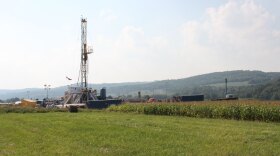Legislators in Madison County have forwarded a proposal that calls for "strong oversight" of hydraulic fracturing. Alaina Potrikus reports in the Post-Standard that the measure is expected to pass the board of supervisors on May 10:
For some Madison County landowners, the fear of accidents hits close to home. Two explosions near the border of Madison and Chenango counties in 2009 raised questions about how local first responders prepare for fires and other emergencies at drilling rigs. In 2007, testing by a natural gas company disrupted water wells in North Brookfield, leaving homeowners without drinking water for weeks. Monday’s resolution doesn’t come out against hydrofracking, but rather asks elected officials to enact strong regulations. The resolution asks that such oversight measures should be “properly funded and staffed,” and called for “sound means of communication between those agencies responsible for public health with the intent of protecting drinking water supplies for all citizens of New York state.”
The New York Public Interest Research Group tells the Associated Press that it's planning to deliver thousands of signatures of New Yorkers against hydraulic fracturing to the governor. The petition is set to be delivered later today.
Fracking in Pennsylvania
At oil and gas industry publication Upstream, Luke Johnson reports that work continued over the weekend to provide "additional integrity" to the Pennsylvania well that blew out last week:
But progress was “slower than anticipated due to the adverse weather conditions hampering work efforts”, the company said in a statement. The cause of the incident is still unclear. Chesapeake told Pennsylvania’s Department of Environmental Protection (DEP) that the loss of well control was caused by a flange that failed beneath the frac stack. On Friday, the DEP sent Chesapeake a notice of violation for the out-of-control well and the resulting spill of chemical-laced fluid. The company violated the Clean Streams Law, the Solid Waste Management Act and the Oil and Gas Act, according to the DEP notice.
Geologists in Pennsylvania are beginning to map deep water aquifers, reports Robert Swift at The Daily Review. The move is a response to concerns about fracking operations dipping into deep reserves of water:
With Marcellus wells reaching several thousand feet deeper than traditional shallow gas wells, locating the deep aquifers will tell geologists where potable water supplies that could be affected by drilling operations can be found. The Pennsylvania Topographic and Geologic Survey, one of state government's oldest offices dating to 1836, is taking on new work as a result of Marcellus development, survey director George Love told the citizens' advisory council for the Department of Conservation and Natural Resources. Geologists are also consulting an extensive water well inventory as part of this effort. Under state law, drillers of water wells are required to submit a public record after completing a new well. In addition to locating aquifers, the survey is starting to examine the impact of hydrofracking operations on groundwater supplies, he added.
Opinion
The New York Post has an editorial today about fracking urging that the state not "study it to death." There's also a column by Karen Moreau, who argues that fracking could save family farmers with its spillover economic benefits.
Want more energy news from the Innovation Trail? Subscribe to the feed.




